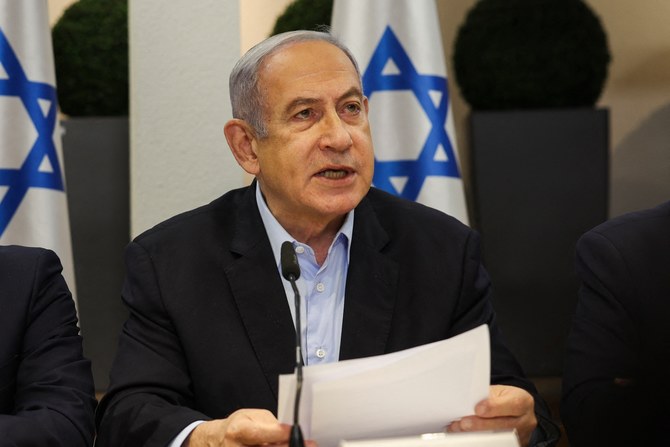Yossi Mekelberg
More than four months into the war in Gaza and with no end in sight, it has become apparent that this ongoing tragedy is tearing Israeli society apart. There is an expectation that a country in the midst of a war, particularly after the shock followed by the trauma of Hamas’ Oct. 7 attack, will unite in grief and a shared sense of purpose.
This did happen for a very brief period, but then the cracks started showing. Much of this should be attributed to the discordant character of the current coalition government. Chief of those who rule by driving wedges into society is Prime Minister Benjamin Netanyahu, who aims to serve his own vested interest by holding onto power indefinitely.
For Netanyahu and his allies, nothing is sacred anymore and, between them, the motivation is either to remain in power despite their colossal failure to prevent the disaster inflicted by Hamas or to use the war as a springboard for applying the most extreme far-right religious ideology, which does not shy away from demanding that Israel reoccupy Gaza and resettle it, as well as annex the West Bank. Retaining the most powerful office in the land makes it easier for Netanyahu to derail his corruption trial by constantly undermining the justices. His thirst for power matches that of his coalition partners who ideologically oppose the independence of the judiciary and despise the idea of a liberal democracy cherished by the more liberal-progressive minded. Hence, the latter have become a target for accusations of not being Jewish enough, of being generally decadent and, in relations with the Palestinians, being either naive or plainly traitors.
Shamelessly, the very government that failed to defend its citizens on the day that has become known as the “black sabbath” is now turning the blame for it on those who protested in support of the independence of the judiciary. It is also turning against the families of the hostages for their demand that the government advance a deal with Hamas for the release of their loved ones. The government accuses both of preventing the army from completing its task in Gaza. The war has brought the worst out of the unscrupulous chorus of the right – its government and its loyal media – as it shamelessly attacks the leaders of opposition parties and those who have led the pro-democracy protests. On one occasion, a Likud MK – yes, an elected lawmaker – revealed on X that the husband of one of the leaders of the protests, Shikma Bresler, is a senior Shin Bet official and, against the law, published his name. Without offering any evidence, the MK claimed that just days before the Hamas attack, he spoke on the phone with Yahya Sinwar, the leader of Hamas in Gaza, implying that there was a conspiracy between Hamas and the Israeli security forces to allow this attack, with the sole aim of toppling the current government.
In other words, accusing them of treason and putting them and their families at risk by revealing their names.
As a result of such constant and vicious incitements flooding social media, it is not surprising that a recent survey concluded that one in five Israeli Jews believe that the Israeli left is to blame for the failure to stop Hamas from committing atrocities against the communities along the border with Gaza and is also preventing the Israeli armed forces from achieving its objectives. If this trend continues, political violence, even civil war, will be within the realm of possibility. Attempts to delegitimize the liberal-progressive social and political forces in Israel are nothing new and, since Likud came to power in 1977, right-wing extremists have not refrained from political violence either. Admittedly, actual political violence has been sporadic, although in 1995 it claimed the life of Prime Minister Yitzhak Rabin, who was assassinated by an extreme right-wing assailant who admitted that he committed this act in order to stop the peace process following the signing of the Oslo Accords.
But if political violence is not common, vitriolic language of the worst kind, intimidation and delegitimization have reached fever pitch since the sixth Netanyahu government, the most ultranationalist, messianic and religious administration in the country’s history, was formed just over a year ago. It has, after a short hiatus following Oct. 7, resumed such behavior with even more venom.
For example, controlling the narrative enables Netanyahu and his government to promote their anti-democratic legislation and falsely portray it as a reform to improve Israel’s democracy. Controlling the narrative enables him to legitimize the vilest ultranationalist-religious version of Zionism, including violent groups of settlers, bring them to the heart of his government and depict it as forming the first true right-wing government to be immune from foreign influence. Controlling the narrative is also to deflect the blame for Netanyahu’s total failure to avert Hamas’ deadly attack and to release the hostages or to defeat Hamas onto the opposition, while depicting the prime minister as blameless. This ignores the fact that it was his idea to allow vast amounts of money to be transferred to Hamas and, by that, strengthening the group.
Whenever Netanyahu has his back to the wall, he resorts to the oldest and dirtiest trick in the far-right’s playbook: finding a scapegoat in the form of a fictitious enemy within by viciously smearing his political opponents and questioning their loyalty to the country. Inevitably, Netanyahu will soon be democratically forced out of office, but his divisive legacy will be much more difficult to uproot. It is threatening the already fragile fabric of Israeli society. Hence, the overriding task of the next government will be to heal this fragmentation, while also striving for peace with the Palestinians; both mammoth tasks that are closely related and equally important.
Arab News







